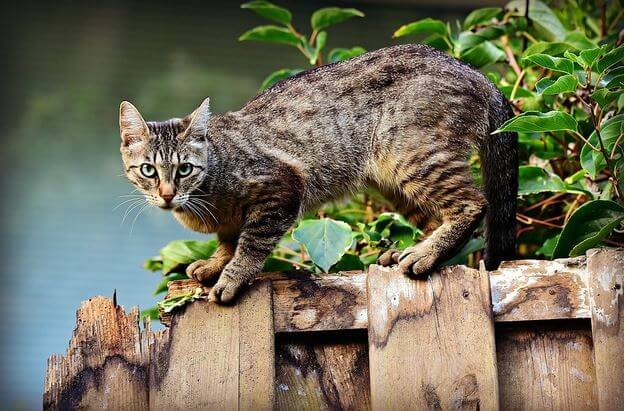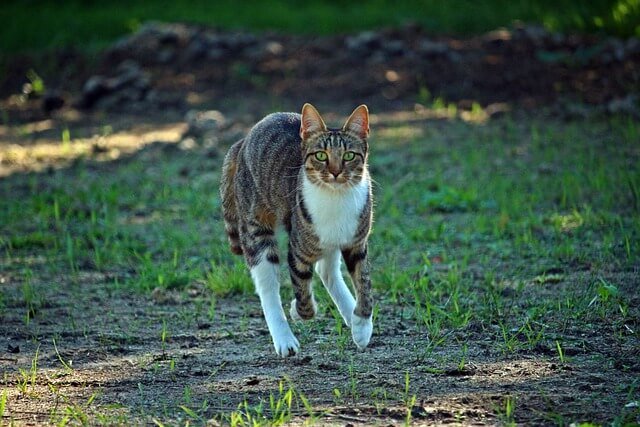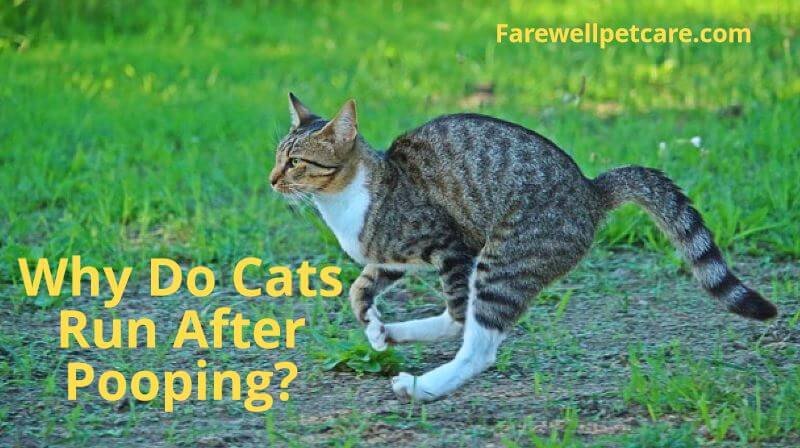You may have seen your cat bolt out from the litter box after pooping and wondered what’s really happening to her. You may ask questions like; is this a cat’s normal behavior? If so, then why do cats run after pooping?
Cats run after pooping because of cat zoomies after the vagus nerve is stimulated. Defecation stimulates this nerve – hence the euphoric behavior. Running is a way to escape predators in the wild, as the poop smell can attract such threats. Yet your cat could have some discomfort while pooping.
Read on to know why your cat runs from the litter box, sometimes even before finishing helping herself. You will also learn how to manage your cat in such circumstances.
What Are Cat Zoomies?
Cat zoomies are bizarre cat behaviors that include sudden running, bopping, pouncing, and other forms of sudden hyperactivity. The cat may also meow or bolt outside to quickly climb trees – just out of nowhere.
Initially, you may think that something is chasing your good feline friend. But, nope, it’s the case of cat zoomies. Cat zoomies usually happen late at night – don’t be surprised to wake up to your furry friend running in circles and climbing furniture as early at dawn as 2:00 a.m.
According to Patrik Holmboe, a veterinarian at Cooper Pet Care, “Zoomies are a normal behavior that should not worry pet parents.”
In fact, seeing your cat dart back and forth in successive, high-speed bursts can be entertaining. It gets even more fun with the cat chasing her tail.
Causes of Cat Zoomies

An indoor cat behavior, cat zoomies are common in cats because they don’t usually have the opportunity to express their predatory instincts outdoors. So, their bodies have plenty of untapped energy.
Here are the main causes of cat zoomies:
- Pent-up energy: When cats spend most of their time sleeping during the day, it builds pent-up energy. Yet, this energy has to be released – eventually leading to quick bursting runs and rushes.
- Irritation or aggression: For some reason, cats get distressed. This can irritate them or cause aggressive behavior like running and climbing objects.
- Pooping: Potty time makes your feline friend a bit nervous. It can make her restless or act fidgety, leading to cat zoomies.
Generally, the causes of cat zoomies are believed to be natural and based on instinctual behavior. They are more common in younger kitties because of untapped energy.
Find Out: Why Is My Cat So Affectionate in the Morning? Find Out
Why Do Cats Run After Pooping? 5 Causes and Solutions
Cats run after pooping for many reasons, including keeping off dirt in the litter box, safety, pain and discomfort, anxiety, and lack of privacy.
1. Cats Run to Keep Off the Dirt
Thanks to their cleanliness instincts, cats run after pooping to avoid smelling or coming into contact with their waste.
Naturally, cats are clean animals known for their grooming habits and preference for clean surroundings. So, don’t expect your cat to stay around after relieving herself.
To keep clean, she will stay away from any form of dirt – and poop is the last thing she wants to encounter around her. Besides asserting their cleanliness, distancing from the poop may be a safety strategy.
Solution:
Always make sure the litter box is clean and maintained well. Scoop the litter box daily to remove all waste and clumps. If necessary, change the litter and clean the box regularly.
If the litter box is clean and waste-free, your cat may engage in proper litter box habits without having to bolt because she encountered a lot of dirt.
Alternatively, you can have multiple litter boxes if you have many cats. This ensures no overcrowding and enough space for each cat.
Additionally, place the litter box in a quiet and private location. If the cat feels private, she can do her business without a fuss.
Also Read: How Long After Deworming a Cat Are the Worms Gone?
2. It’s a Natural Way of Seeking Safety
A cat is still a cat, even in the house. She has the same natural instincts as other feline members in the wild. Usually, felines mark their territories and eliminate scents that can expose them to predators.
So, if you see a cat run from her poop, it’s probably because she doesn’t want to be noticed or located by a “predator”. In fact, when a cat helps herself outside the house, they ordinarily bury the poop.
Burying poop is an innate behavior fueled by their evolutionary history and survival strategies. You should also note that cats are naturally stealthy. If she runs away from the poop, it’s a means of minimizing exposure to potential threats.
Solution:
Enrich the cat’s surroundings with vertical spaces and scratching and hiding spots to help her mark and explore the environment, simulating natural behaviors.
Harness the running into positive associations. For example, praise or reward the cat for positive habits after using the litter box.
Reduce stressors in the environment. For instance, avoid sudden changes in diet or litter box location.
3. Your Cat Experienced Discomfort or Pain

When your cat feels pain or discomfort during pooping, she can’t wait to stop and finish the business. To show her frustration and distress, she expresses gross running behavior.
Usually, such discomfort results from infections or inflammatory processes in the urinary tract, colon, rectum, or bowel. Some of the serious medical issues you want to check out include;
- Diarrhea
- Constipation
- Blood in stool or urine
- Digestive disorders
- Urinary tract infections
What’s in your cat’s mind is the pain or discomfort during defecation. Once she finishes, her best option is to run away from the ‘pain spot’ – hence the cat zoomies.
Solution:
All medical issues should be handled immediately. Give your veterinarian a quick call to diagnose your feline friend and discover the actual problem.
If there’s an underlying issue, your vet will prescribe suitable medications to relieve the pain and reduce inflammation. You should provide enough liquids to ensure proper hydration if your cat has diarrhea.
4. Cats May Run Due to Anxiety or Stress
Your cat running away after pooping could be initiated by anxiety or stressors in and around the litter box. Since cats are extremely sensitive, any changes in their environment can lead to sudden behavior to show their emotional state.
Factors that can trigger stress and anxiety exist in your cat include:
- Lack of privacy
- Inappropriate litter box location
- Loud noise
- Routine changes
- Conflicts with other pets in the house and even infections
Solution:
Enhance privacy to allow the cat to carry out her business without disruptions. Your cat can use more hiding spots and vertical spaces like cat trees and a quiet space.
After the cat uses the litter box, praise and even reward her to encourage positive associations around the litter box.
5. Your Cat Is Excited After Relief
If your cat feels constrained while defecating, she gets excited after the business because it offers relief. The excitement is usually displayed through energy release. That’s why she would bolt off in sudden runs and bursts.
It denotes a release of tension that had initially held her bowel. Hence, a feeling of relief and comfort.
Solution:
To manage bursts of excitement, offer your cat regular interactive play sessions with fast-moving toys. Moreover, schedule playtime daily to help your cat expend their energy in a controlled manner.
You can also engage your cat immediately after using the litter box to prevent the zoomies.
Why Do Cats Sprint Before Pooping?
Cats sprint before pooping due to vagus nerve stimulation or an underlying medical problem. Once stimulated, the vagus nerve activates the nervous system to coordinate flight.
The vagus nerve can cause;
- Excitement
- Anxiety and euphoria
- Induce stress feelings
- Fear
When defecation comes calling, the cat’s vagus nerve is activated, causing her to become ‘high’. The result is zoomies.
Meanwhile, underlying medical conditions can also necessitate sprinting before defecation. For example, diarrhea, constipation, or urinary tract infections may cause significant discomfort and pain, causing the cat to sprint.
On the other hand, the cat may run to find a more comfortable spot to answer nature’s call.
Final Thoughts
If the question, “Why do cats run after pooping?” has always been in your mind, you now know the reason.
There no need to worry since this is an instinctual behavior. Your domesticated feline friend is just doing what she would while in the wilderness.
Although your cat running after pooping is normal, you can minimize the behavior for hygiene purposes by creating a conducive and private environment for your cat to relieve herself.

